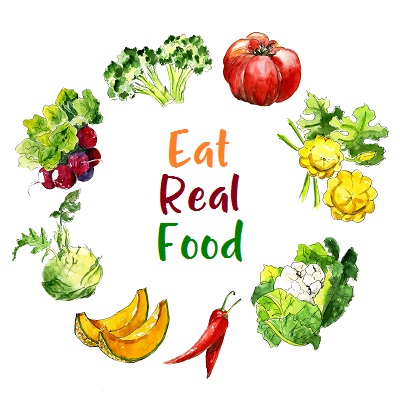Eat to Age Exceptionally
 Are you a victim of fake food? You think that you are pretty good at spotting empty calorie or processed foods, but there are a few fake foods possibly hiding in your pantry or fridge. According to Larry Olmstead, the author of Real Food Fake Food, what you are purchasing at the grocery store or in restaurants may not fall under the category of real food.
Are you a victim of fake food? You think that you are pretty good at spotting empty calorie or processed foods, but there are a few fake foods possibly hiding in your pantry or fridge. According to Larry Olmstead, the author of Real Food Fake Food, what you are purchasing at the grocery store or in restaurants may not fall under the category of real food.
What is Real Food?
Real food is the food you buy or eat that is 100% what you think you are getting. Think of real food as that which is available without the effects of additives, preservatives or pesticides. Fruits, vegetables, nuts, and seeds are organic.
Meat and seafood are wild, grass-fed or pasture-raised. Whole grains are 100% whole grains. Beans and legumes are available in cans that are BPA-free. Herbs and spices are organic, fresh or dry or ground with minimal to no processing. It is unaltered and unprocessed. Sweeteners are unrefined. Continue reading
 As we age, diet plays a more significant role in maintaining our health. A well-balanced diet can mean the difference between feeling energized or sluggish. It also can ward off chronic diseases and improve the way your body fights off illness.
As we age, diet plays a more significant role in maintaining our health. A well-balanced diet can mean the difference between feeling energized or sluggish. It also can ward off chronic diseases and improve the way your body fights off illness.
Malnutrition affects weight. It also can leave your bones and muscles weak and joints achy. Other signs can be frequent falls and bone fractures, even depression. “Malnutrition can also lead to delayed wound healing, chronic digestive upset, extreme hair loss, brittle nails, and rapid cognitive decline,” says Natalie Butler, RD, and LD.
Focusing more on foods rich in fiber, vitamins, minerals, and other nutrients is key. However, there are several factors to consider because the way we view food changes as we age. This could be due to a diminishing appetite, or trouble digesting foods like we did before. However, no matter what the reasons are that are getting in the way of good nutrition, there are reasons why the older we get, the healthier we need to eat: Continue reading






